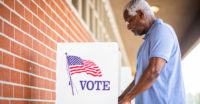Automatic Voter Registration
Automatic Voter Registration (AVR) is a system of automatically adding individuals to the voter rolls when they apply for a driver’s license or state identification card at the state’s licensing office or other agencies.
In many cases, AVR does not require voters to sign or affirm a statement attesting to their eligibility to vote and does not allow voters to decline to register until days or weeks later. In many cases, there is no verification of citizenship or other qualifications prior to registration. As a result, many argue that AVR violates the National Voter Registration Act (NVRA) as it does not require voters to affirm their eligibility at the time of registration.

Under the National Voter Registration Act (NVRA), state and federal registration forms are available in all types of state agencies and in each local election office. With voter registration never being easier in America, there is simply no need to place all citizens on the voter registration rolls regardless of eligibility or personal choice.
Below are some of the free speech arguments against AVR:
- AVR takes the personal choice of registration away from the individual and violates a citizen’s First Amendment right to not participate in the electoral system.
- The act of registration or voting is undoubtedly an act of political speech. Similarly, citizens have a personal right not to speak, vote or register to vote.
- Many citizens are, in fact, trying to make a political statement when they choose not to register because they are not interested in the election or the candidates, believe that their vote will not make a difference, or do not wish to participate in politics.
- AVR registration also violates a citizen’s right to privacy, as voter registration lists are publicly available records and citizens do not have an opportunity to decline to participate.
There is no evidence that AVR increases turnout, but rather creates unnecessary problems in the accurate registration of voters. In Canada, automatic voter registration did not increase voter participation.
Registration in the United States is easy, and voters already have multiple ways to register, either in person, by mail, and in most cases, online registration. There are also many nonprofit groups whose major purpose is registering citizens to vote and who solicit registrations every election cycle.
Automatic registration results in many ineligible names being added, creating inaccurate voter rolls. AVR increases the vulnerability of the system for fraud by registering people who have no intention of voting in the jurisdiction, and increasing the potential for others to vote in the non-voter’s name.
There are millions of outdated and inaccurate voter registrations across the country, and automatic voter registration will only worsen the problem. Under AVR, individuals could be registered in multiple locations without their knowledge simply because they interact with a government agency.
ACRU Commentary
Is Universal Voter Registration Constitutional?
3/28: Globe columnist Jeff Jacoby makes the argument that universal voter registration is a terrible idea.
Noncitizens, Voting Violations and U.S. Elections
This report, from Federation for American Immigration Reform (FAIR), was published in November of 2016.
Automatic Voter Registration Expands Government Automatically
Often, there is no verification of citizenship or other qualifications prior to registration.
Maine: Here’s Your License, Now Get Into that Voting Booth
Democrats are trying to cram the voting rolls with people who can’t be bothered to register.
Mandatory Voter Registration: How Universal Registration Threatens Electoral Integrity
(March 27, 2013) Mandatory voter registration (MVR), previously termed “universal” registration, could significantly damage the integrity of America’s voter registration system. The “voter registration modernization” concept of automatically registering individuals through information contained in various [...]
ACLU: Investigate Maine Governor for Advising Students to Obey Election Law
Mr. LePage’s remarks may discourage “civic participation” by students, according to Maine's ACLU chapter.
News
Protect Elderly Votes Project Aims to Thwart ‘Vote Harvesting’ Fraud
The Daily Signal reports on ACRU's Protect Elderly Votes and Stranger Danger campaigns, created to protect seniors' votes from theft, manipulation and outright ballot fraud.
Liberal vote activist foundation, collect ballots thyself
Much like the CTCL described in the previous story, the Committee of Seventy is a PA-based liberal voting activist group masquerading as non-partisan. Its Director is a Clinton/Reno protégée, and is funded by liberal foundations. Now the City of Philadelphia has contracted with this group to help collect ballots.
Liberal vote activist foundation, funds liberal vote activist foundation advisor
The Center for Tech and Civic Life is a leftist group claiming to use technology to “modernize” voting. Funded by liberal companies and run by self-identified progressive and Obama-affiliated staff, it is insinuating itself into elections. CTCL just gave Dallas County election administrator Toni Pippins-Poole $15 million for “voting operations” after Gov. Abbott wisely halted the liberal push for unsolicited mail-only ballots. Coincidentally, Ms. Pippins-Poole is also a CTCL advisor.
Project Veritas uncovers ‘ballot harvesting fraud’ in Minnesota
A ballot-harvesting racket in Democratic Rep. Ilhan Omar’s Minneapolis district — where paid workers illegally gather absentee ballots from elderly Somali immigrants — appears to have been busted by undercover news organization Project Veritas.
Groundbreaking National Voter Roll Study Reveals Alarming Trends as States Prepare to Vote by Mail
Our colleagues at PILF have performed an extensive nationwide study and found U.S. voter rolls are full of errors, deceased voters and duplicate registrations. They found nearly half a million problems -- how many remain undiscovered?
Pennsylvania – watchdog group finds 800K questionable registered on county voter rolls
Judicial Watch announced today that it filed a lawsuit against Pennsylvania and three of its counties for failing to make reasonable efforts to remove ineligible voters from their rolls as required by the federal National Voter Registration Act of 1993 (NVRA).











